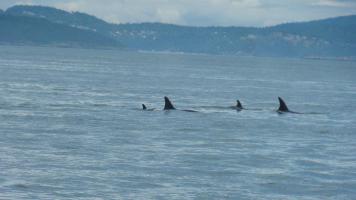Tahlequah's Tour of Grief
In 2018, a Southern Resident killer whale named Tahlequah (J-35) mourned the death of her newborn calf, Tali, in a very extreme way. For seventeen days and over 1,000 miles, she supported Tali's lifeless body on her rostrum around the Salish Sea off the coast of Washington. Relentlessly, Tahlequah ploughed through the waters, accompanied by her pod. After seven days, Tahlequah's family members assisted in keeping Tali afloat so that the grieving mother could eat and rest. Researchers noted that by the ninth day, Tali's little body showed signs of decomposition. For a few days, J pod fell off the radar but were sighted again on the 16th day. Tahlequah continued to keep Tali with her as she swam in the waters surrounding the San Juan Islands. On the 17th day, the grieving mother released her deceased calf and rejoined J pod.
Tahlequah went on to have two more calves: Phoenix (J57) born in July of 2020, and another in December of 2024 - J61. J61 passed shortly after birth and her lifeless body was carried by Tahlequah around the waters of the Puget Sound. Voyaging on another tour of grief, Tahlequah swam in mourning for over 11 days.
Prior to Tali and J61's deaths, Tahlequah adopted her sister Polaris' two offspring after Polaris passed away. One of those calves wasn't weaned yet and starved to death while a ward of Tahlequah.
As a counselor who specializes in Prolonged Grief Disorder, I've wondered if Tahlequah's experience with the tragic wasting death of her niece complicated her grief for the loss of her own two offspring, Tali and J61. To watch your adopted child die and be unable to do anything to save her must have been excruiatingly painful for Tahlequah. Orca gestation period lasts 12 -18 months and calves are milk-depedent for approximately 3 years. The bond between mother and child is great.
...to be continued

